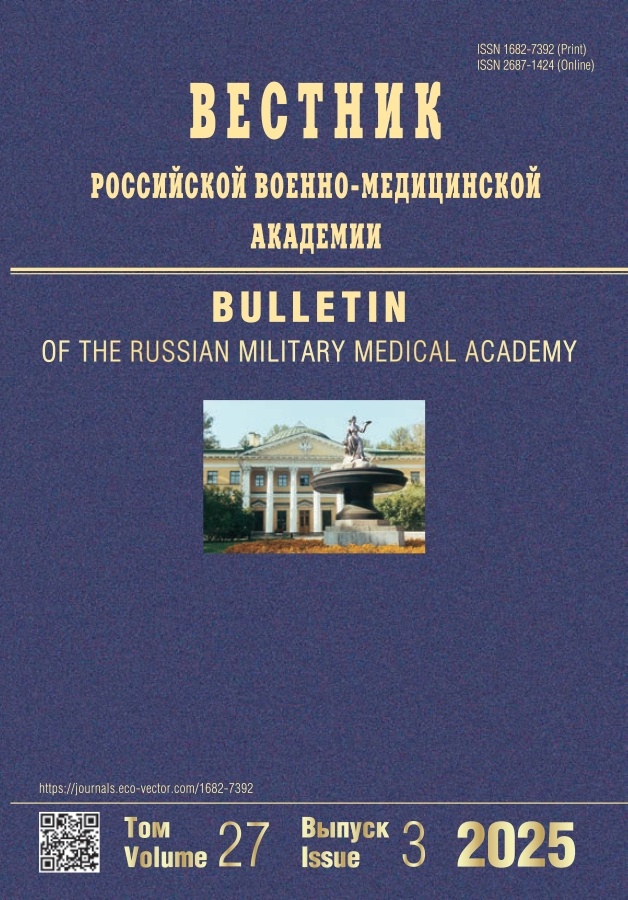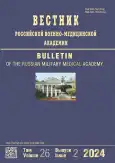The use of biofeedback training in complex therapy of neurotic disorders and correction of negative psychological consequences of combat stress in combatants
- 作者: Kryukov E.V.1, Ovchinnikov D.V.1, Yusupov V.V.1, Golovko K.P.1, Zelenina N.V.1, Kurasov E.S.1, Fedotkina I.V.1, Dorofeev I.I.1
-
隶属关系:
- Kirov Military Medical Academy
- 期: 卷 26, 编号 2 (2024)
- 页面: 185-196
- 栏目: Original Study Article
- URL: https://journals.rcsi.science/1682-7392/article/view/267234
- DOI: https://doi.org/10.17816/brmma624875
- ID: 267234
如何引用文章
详细
The parameters and effectiveness of biofeedback training in the complex treatment of neurotic disorders at the hospital stage and psychological correction at the sanatorium stages of rehabilitation of military personnel were assessed. We examined 40 mentally healthy military personnel who participated in combat operations and 36 military personnel who participated in combat operations and suffered from stress-associated neurotic disorders and who were undergoing inpatient treatment in the S.M. Kirov Military Medical Academy clinics. In identifying possible negative psychological consequences of combat stress in a group of mentally healthy military personnel, a medical and psychological examination was performed using the military version of the Mississippi scale for assessing post-traumatic reactions, Neurotic Disorders-Symptomatic Questionnaire, and Quality of Life Questionnaire-12. The military personnel underwent stress testing according to a specially developed scenario using a biofeedback hardware software complex to assess individual changes in physiological parameters in response to emotionally significant stimuli. In the military personnel who participated in combat operations and suffered from neurotic disorders, a medical and psychological examination was performed using the Neurotic Disorders-Symptomatic Questionnaire and Quality of Life Questionnaire-12 upon admission to the hospital and on the eve of discharge, and stress testing was conducted upon admission to the hospital. The therapeutic effectiveness of biofeedback training in the treatment of neurotic disorders was evaluated by comparing the results of treatment between two groups of 18 individuals each. One group received only drug therapy, whereas the other group, in addition to drug therapy, underwent biofeedback training on the amplitude of the systolic wave. The level of stress-associated psychogenic damage was found to be correlated with the amplitude of the systolic wave according to the digital photoplethysmogram. Moreover, the physiological indicators of the circulatory and respiratory systems, used in foreign studies for psychophysiological training in the treatment of post-stress disorders, were not associated with the level of psychogenic damage, indicating their lack of involvement in pathogenesis and the ineffectiveness of their use. The addition of biofeedback training on the amplitude of the systolic wave to the complex therapy of neurotic disorders leveled astheno-neurotic symptoms and improved quality of life. Therefore, when treating astheno-neurotic disorders in military personnel participating in combat operations, it is critical to include biofeedback training on the amplitude of the systolic wave; this reduces severity of neurotic symptoms, improves quality of life, and forms preventive skill of conscious control of excessive physiological reactions of combat stress. Furthermore, the correlation between the magnitude of the decrease in the amplitude of the systolic wave and level of mental damage in combatants, revealed during stress testing, indicates the importance of biofeedback training on the amplitude of the systolic wave in sanatorium-resort organizations and military clinical hospitals of the Russian Ministry of Defense for the medical and psychological rehabilitation of military personnel exhibiting negative symptoms and those suffering from psychological consequences of combat stress.
作者简介
Evgeniy Kryukov
Kirov Military Medical Academy
Email: zelnatvas@mail.ru
ORCID iD: 0000-0002-8396-1936
SPIN 代码: 3900-3441
MD. Dr. Sci. (Med.), professor
俄罗斯联邦, Saint PetersburgDmitrii Ovchinnikov
Kirov Military Medical Academy
Email: zelnatvas@mail.ru
ORCID iD: 0000-0001-8408-5301
SPIN 代码: 5437-3457
MD, Cand. Sci. (Med.), associate professor
俄罗斯联邦, Saint PetersburgVladislav Yusupov
Kirov Military Medical Academy
Email: zelnatvas@mail.ru
ORCID iD: 0000-0002-5236-8419
SPIN 代码: 9042-3320
MD. Dr. Sci. (Med.), professor
俄罗斯联邦, Saint PetersburgKonstantin Golovko
Kirov Military Medical Academy
Email: zelnatvas@mail.ru
ORCID iD: 0000-0002-1584-1748
SPIN 代码: 2299-6153
MD. Dr. Sci. (Med.)
俄罗斯联邦, Saint PetersburgNatalya Zelenina
Kirov Military Medical Academy
编辑信件的主要联系方式.
Email: zelnatvas@mail.ru
ORCID iD: 0000-0002-8130-7690
SPIN 代码: 1173-1255
MD, Cand. Sci. (Biol.), associate professor
俄罗斯联邦, Saint PetersburgEvgeniy Kurasov
Kirov Military Medical Academy
Email: zelnatvas@mail.ru
ORCID iD: 0000-0003-3616-6574
SPIN 代码: 4961-0342
MD. Dr. Sci. (Med.), professor
俄罗斯联邦, Saint PetersburgIrina Fedotkina
Kirov Military Medical Academy
Email: fedotkini@gmail.com
ORCID iD: 0000-0003-4838-6515
SPIN 代码: 8202-2753
MD, Cand. Sci. (Psy.), associate professor
俄罗斯联邦, Saint PetersburgIvan Dorofeev
Kirov Military Medical Academy
Email: zelnatvas@mail.ru
ORCID iD: 0009-0005-3195-3423
SPIN 代码: 6068-7300
MD, Cand. Sci. (Med.), associate professor
俄罗斯联邦, Saint Petersburg参考
- Litvintsev SV, Snedkov EV, Reznik AM. Combat mental trauma. Moscow: Medicine; 2017. 98 р. (In Russ.) EDN: QLLIDF
- Military psychiatry in the XXI century: modern problems and development prospects. Ed. Kryukov EV, Shamrey VK. Saint Petersburg: Spetslit; 2022. 367 р. (In Russ.)
- Sivaschenko PP, Evdokimov VI, Grigoriev SG, Ivanov VV. Dynamics and structure of dismissal due to health conditions of officers of the Armed Forces of the Russian Federation in 2003–2018. Military Medical Journal. 2020;341(6):4–8. EDN: YVEXWR doi: 10.17816/RMMJ82217
- Shamrey VK, Marchenko AA, Yusupov VV, et al. Characteristic features of psychological and psychiatric care for military personnel in modern armed conflicts. Medical-biological and social psychological problems of safety in emergency situations. 2022;(2):60–71. (In Russ.) EDN: CLLBTE doi: 10.25016/2541-7487-2022-0-2-60-71
- Marchenko AA, Shamrey VK. Wartime psychogenies (acute reactive states). Saint Petersburg: VMedA; 2018. 47 р. (In Russ.)
- Steenkamp MM, Nickerson A, Maguen S, et al. Latent classes of PTSD symptoms in Vietnam veterans. Behav Modif. 2012;36(6): 857–874. doi: 10.1177/0145445512450908
- Mota NP, Tsai J, Sareen J, et al. High burden of subthreshold DSM-5 post-traumatic stress disorder in U.S. military veterans. World Psychiatry. 2016;15(2):185–186. doi: 10.1002/wps.20313
- Snedkov EV. Long-term consequences of combat mental trauma. In: materials of the All-Russian scientific and practical conference. Mental health of military personnel and specialists in extreme types of professional activity: Saint Petersburg: VMA im. S.M. Kirova; 2022:15–18. (In Russ.) EDN: CBRDGK
- Apchel VYa, Tsygan VN. Stress and stress resistance of man. Saint Petersburg: VMedA; 1999. 88 p. (In Russ.)
- Ruzinova VM, Dolgopolova YuV, Petelin DS, et al. The use of biofeedback technologies in clinical practice. Medical Council. 2023;17(13):288–296. EDN: SSQVIK doi: 10.21518/ms2023-245
- Bouchard S, Bernier F, Boivin E, et al. Using biofeedback while immersed in a stressful videogame increases the effectiveness of stress management skills in soldiers. PloS One. 2012;7(4):e36169. doi: 10.1371/journal.pone.0036169
- Lewis GF, Hourani L, Tueller S, et al. Relaxation training assisted by heart rate variability biofeedback: implication for a military predeployment stress inoculation protocol. Psychophysiology. 2015;52(9):1167–1174. doi: 10.1111/psyp.12455
- Hourani S, Tueller P, Kizakevich P, et al. Toward preventing post-traumatic stress disorder: development and testing of a pilot predeployment stress inoculation training program. Mil Med. 2016;181(9):1151–1160. doi: 10.7205/MILMED-D-15-00192
- Petta LM. Resonance Frequency Breathing Biofeedback to Reduce Symptoms of Subthreshold PTSD with an Air Force Special Tactics Operator: a case study. Appl Psychophysiol Biofeedback. 2017;42(2):139–146. doi: 10.1007/s10484-017-9356-2
- Blase KL, van Dijke A, Cluitmans PJ, Vermetten E. Efficacy of HRV-biofeedback as additional treatment of depression and PTSD. Tijdschr Psychiatr. 2016;58(4):292–300.
- Chiba T, Kanazawa T, Koizumi A., et al. Current status of neurofeedback for post-traumatic stress disorder: a systematic review and the possibility of decoded neurofeedback. Front Hum Neurosci. 2019;13:233. doi: 10.3389/fnhum.2019.00233
- Tarabrina NV. Workshop on the psychology of post-traumatic stress disorder. Saint Petersburg: Peter; 2001. 272 р. (In Russ.) EDN: VOJUUF
- Hurst NP, Ruta DA, Kind P. Comparison of the MOS short form-12 (SF12) health status questionnaire with the SF36 in patients with rheumatoid arthritis. Br J Rheumatol. 1998;37(8):862–869. doi: 10.1093/rheumatology/37.8.862
- Patent RUS № 2692454С1 / 24.06.2019. Zelenina NV, Nazarov SS, Marchenko AA, et al. A method for psychophysiological diagnosis of individual signs of chronic post-traumatic stress disorder in military combatants. Available from: https://patents.google.com/patent/RU2692454C1/ru
- Litvintsev SV, Snedkov EV. Psychiatric care for military personnel in Afghanistan (1979–1989). Saint Petersburg: VMedA; 1997. 54 р. (In Russ.)
- Snedkov EV, Litvintsev SV, Reznik AM. Stress disorders in combat conditions. Psychiatry. 2003;(6):7–14. (In Russ.) EDN: RBMPPT
- Reznik AM. Psychic Disorders in Local Wars Veterans Treated at Psychiatric In-patient Clinics. Disaster Medicine. 2011;1(73):36–38. EDN: LWCPDF
- Zelenina NV, Nazarov SS, Marchenko AA, et al. Features of adaptation after psychical traumatic stress among servicemen who performed special tasks. Bulletin of the Russian Military Medical Academy. 2018;20(3):153–158. EDN: GZOOIK doi: 10.17816/brmma12322
补充文件













